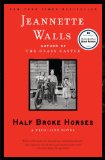Summary | Excerpt | Reading Guide | Reviews | Beyond the Book | Readalikes | Genres & Themes | Author Bio

A True-Life Novel
by Jeannette Walls
"Next time?" Mom asked. "I trust there won't be a next time."
"Hope for the best and plan for the worst," Dad said. "Anyway," he told me, "once you're going down, accept it and let your rump take the punishment. Your body knows how to fall."
Meanwhile, Dad enrolled Roosevelt in what he called Adam Casey's School for Wayward Horses. He tied Roosevelt's head to his tail and left him to stand in a stall until he learned patience. He filled empty tin cans with pebbles and tied those to his mane and tail until Roosevelt got used to commotion.
Once Roosevelt was reformed -- more or less -- Dad sold him at a nice profit to some easterners bound for California. While Dad didn't blame horses for anything, he wasn't sentimental about them, either. If you can't stop a horse, sell him, Dad liked to say, and if you can't sell him, shoot him.
Another one of my jobs was feeding the chickens and collecting the eggs. We had about two dozen chickens and a few roosters. First thing every morning, I'd toss them a handful of corn and some table scraps and add lime to their water to make the eggshells strong. In the spring, when the hens were really fertile, I could collect a hundred eggs a week. We'd set aside twenty-five or thirty for eating, and once a week I drove the buckboard into Toyah to sell the rest to the grocer, Mr. Clutterbuck, a pinched man who wore garters on his sleeves and toted up sales figures on the brown paper he wrapped your goods in. He paid a penny per egg, then sold them for two cents each, which seemed unfair to me since I'd done all the work, raising the chickens, collecting the eggs, and bringing them into town, but Mr. Clutterbuck just said, "Sorry, kid, that's the way the world works."
I also brought in peacock eggs, finally giving those showy old birds a way to earn their keep. At first I thought they'd fetch twice as much as chicken eggs, seeing as how they were twice as big, but Mr. Clutterbuck would give me only a penny each for them. "Egg's an egg," he said. I thought that danged grocer was cheating me because I was a girl, but there wasn't a whole lot I could do about it. That was the way the world worked.
Dad said it was good for me to go into town and bargain with Mr. Clutterbuck over egg prices. It honed my math and taught me the art of negotiation, all of which was going to help me achieve my Purpose in Life. Dad was a philosopher and had what he called his Theory of Purpose, which held that everything in life had a purpose, and unless it achieved that purpose, it was just taking up space on the planet and wasting everybody's time.
That was why Dad never bought any of us kids toys. Play was a waste of time, he said. Instead of playing house or playing with dolls, girls were better off cleaning a real house or looking after a real baby if their Purpose in Life was to become a mother.
Dad didn't actually forbid us from ever playing, and sometimes Buster, Helen, and I rode over to the Dingler ranch for a game of baseball with the Dingler kids. Because we didn't have enough players for two full teams, we made up a lot of our own rules, one being that you could get a runner out by throwing the ball at him. Once, when I was ten and trying to steal a base, one of the Dingler boys threw the ball at me hard and it hit me in the stomach. I doubled over, and when the pain wouldn't go away, Dad took me into Toyah, where the barber who sometimes sewed people up said my appendix had been ruptured and I needed to get up to the hospital in Santa Fe. We caught the next stagecoach, and by the time we got to Santa Fe, I was delirious, and what I remember next was waking up in the hospital with stitches on my stomach, Dad sitting next to me.
"Don't worry, angel," he said. The appendix, he explained, was a vestigial organ, which meant it had no Purpose. If I had to lose an organ, I'd chosen the right one. But, he went on, I'd almost lost my life, and to what end? I'd only been playing a game of baseball. If I wanted to risk my life, I should do it for a Purpose. I decided Dad was right. All I had to do was figure out what my Purpose was.
Excerpted from Half Broke Horses by Jeannette Walls. Copyright © 2009 by Jeannette Walls. Excerpted by permission of Simon & Schuster. All rights reserved. No part of this excerpt may be reproduced or reprinted without permission in writing from the publisher.
When a true genius appears in the world, you may know him by this sign...
Click Here to find out who said this, as well as discovering other famous literary quotes!
Your guide toexceptional books
BookBrowse seeks out and recommends the best in contemporary fiction and nonfiction—books that not only engage and entertain but also deepen our understanding of ourselves and the world around us.